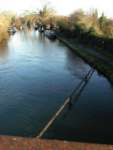 Why is it so tough? Why is it so tough?
The Devizes to Westminster International Canoe Race, often referred to as
the 'Canoeists Everest' is a 125 mile event paddled either non stop or over
four fixed stages, depending on your entry category. The course was first
paddled at Easter in 1948 by two crews of Devizes Rover Scouts, journey
time - ninety hours. A month later a Sea Scout crew completed the paddle in
seventy seven hours; attempts to break that later in the summer were foiled
by the growth of weed in the canal thus establishing Easter as the best
time to make the attempt.
Starting from Devizes Wharf on Good Friday the course covers 53 miles and
56 portages on the Kennet and Avon canal to its confluence with the River
Thames at Reading, thereafter it follows the Thames, a distance of 72 miles
with a further 21 portages, to Westminster. A total distance of 125 miles
with 77 portages. Everyone who completes the course receives a medal.
In addition to the finishers medal there are many trophies to competed for,
including the D.W. Challenge Cup, Men's, Ladies, Mixed, Services, Police,
Scouts, CCF, Schools and Universities; also Team trophies. There is also an
award, know as the Pfiffer Cup presented to the crew who raises the most
money for charity - this has become a very important facet of the race.
- It is long - 125 miles requiring from 15 to 70 hours to complete.
- Senior Doubles paddle non stop through the night.
- Junior Doubles, Senior Singles and Veteran Juniors race over four fixed stages.
- Every 1.7 miles, on average, there is a lock to portage.
- Paddlers cannot rely on flow from the canal/river to help them on their way!
- Paddlers must leave Devizes in time to make the top of the ebb tide at Teddington (100 miles)
- Training takes a good 6 months. Fitness, planning and diet are critical.
- The race requires determination, self motivation and mental perseverance.
- It is exhausting, hypothermia and heat exhaustion are real risks.
- Approximately 30% of paddlers fail to complete the race.
Paddy Ashdown, who paddled the race in 1965:
'We won the folding boat class. It was absolutely crippling - 26 hours. I remember saying afterwards that I could only think of
one person in history who had spent a worse Easter than I had!'
So why do it?!
- To break records.
- To win their category.
- To respond to a physical and mental challenge.
- To find and often exceed their own perceived personal limits.
- To beat their previous time (or a friend's).
- To finish in a reasonable time. (Just to finish is an achievement).
- To raise money, through sponsorship, for charity. (Up to �30,000 per year)
- To take part in a club activity.
- To retain their honour after making rash boasts over numerous pints in the pub!
- It is one of the best known International canoe races.
- Because, like Everest, it's there!
|

